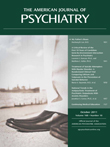Interaction of FKBP5 Gene Variants and Adverse Life Events in Predicting Depression Onset: Results From a 10-Year Prospective Community Study
Abstract
Objective:
The binding protein FKBP5 is an important modulator of the function of the glucocorticoid receptor, the main receptor of the stress hormone system. This turns the FKBP5 gene into a key candidate for gene-environment interactions, which are considered critical for pathogenesis of stress-related disorders. The authors explored gene-environment interactions between FKBP5 gene variants and adverse life events in predicting the first occurrence of a major depressive episode.
Method:
The analyses were based on 884 Caucasians in a 10-year prospective community study. At baseline, they were 14–24 years old and did not fulfill criteria for a major depressive episode. The DSM-IV-based Munich Composite International Diagnostic Interview was used to assess adverse life events preceding baseline and major depressive episodes during follow-up. On the basis of previous findings, five single-nucleotide polymorphisms (SNPs) within the FKBP5 gene were selected for genotyping.
Results:
While the authors did not observe genetic main effects, they found interactions between the five SNPs and traumatic (but not separation) events, with the strongest effect for severe trauma. The effect of trauma on incident major depressive episodes was evident among subjects homozygous for the minor alleles but not subjects with other genotypes. The findings were replicated in the U.K. Environmental Risk Longitudinal Twin Study.
Conclusions:
These hypothesis-driven results suggest that an interaction between FKBP5 genotype and trauma is involved in the onset of depression. Subjects homozygous for the minor alleles of the investigated FKBP5 SNPs seem to be particularly sensitive to effects of trauma exposure in terms of triggering depression onset.



